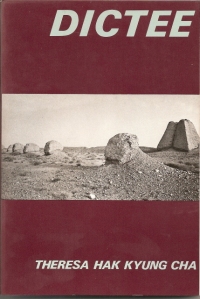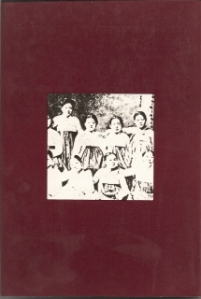La Dictee
There is no future, only the onslaught of time.
Theresa Hak Kyung Cha’s Dictee (NY: Tanam Pres, 1982) is an experiment in autobiography that blends poetry and prose, history and memoir, and reproductions of photographs and documents. Many of Cha’s themes overlap with those found in the work of W.G. Sebald: history, memory, war, cruelty, family.
To the other nations who are not witnesses, who are not subject to the same oppressions, they cannot know. Unfathomable the words, the terminology: enemy, atrocities, conquest, betrayal, invasion, destruction. They exist only in the larger perception of History’s recording, that affirmed, admittedly and unmistakably, one enemy nation has disregarded the humanity of another. Not physical enough. Not to the very flesh and bone, to the core, to the mark, to the point where it is necessary to intervene, even if to invent anew, expressions, for this experience, for this outcome, that does not cease to continue.
To the others, these accounts are about (one more) distant land, like (any other) distant land, without any discernable features in the narrative, (all the same) distant like any other.
But Cha adds additional layers: Catholicism and feminism. Dictee opens with Communion, followed by confession, and it closes with a scene embodying acts of charity (water, medicine, advice) between a woman and a young girl. Overseeing Cha’s enterprise are the nine classical Muses, the daughters of Zeus and Mnemosyne (memory) who presided over the arts and sciences. Each of Dictee‘s chapters is assigned the name of a Muse. The history that Cha probes is the story of twentieth century Korea (where her family originated): the Occupation by Japan as a result of the Sino-Japanese War; the country’s division into two parts as a result of the Cold War; and the violent student demonstrations of the 1960s.
But Cha’s main concern, it seems to me, is human communication itself. Dictee (the dictation) is structured as an unending struggle to move from inarticulateness to utterance. Words become syllables, sentences become strings of single words, continuity is disrupted. Where, Cha seems to ask, does language become meaning? Parts of the book are written in French and there are many references to the issues of translation and multilingualism.
Dictee is heavily influenced by film theory. It contains abrupt jump cuts, makes powerful use of vantage point, and dwells on the intellectual dichotomy of listening to spoken language while reading sub-titles in a different language. Following the lead of Michel Butor and other French writers of the nouveau roman, Cha sometimes moves into second person in an attempt to obliterate the boundary between reader and subject.
Her movements are already punctuated by the movement of the camera, her pace, her time, her rhythm. You move from the same distance as the visitor, with the same awe, same reticence, the same anticipation. Stationary on the light never still on her bath water, then slowly moving from room to room, through the same lean and open spaces. Her dress hangs on a door, the cloth is of a light background, revealing the surface with a landscape stained with the slightest of hue. Her portrait is not represented in a still photograph, nor in a painting. All along, you see her without actually seeing, actually having seen her. You do not see her. For the moment, you see only her traces.
More than once, as I read Dictee, I was eerily reminded of Chris Marker’s 1962 film La Jetée.
A decade ahead of Sebald, Cha interlaced her text with uncredited news photographs, portraits, reproductions of documents, and even reproductions of what appear to be the handwritten manuscript for the pages of Dictee.
Theresa Hak Kyung Cha was born in Korea, but raised in the US. After studying at the University of California, Berkeley, she studied filmmaking and critical theory in Paris. A week after Dictee was published, she was murdered by a stranger on the streets of New York. Tanam Press was an important publisher of avantgarde art titles (Jenny Holzer, Reese Williams, Philip Glass, Werner Herzog, Richard Prince) from 1980 to 1986.



